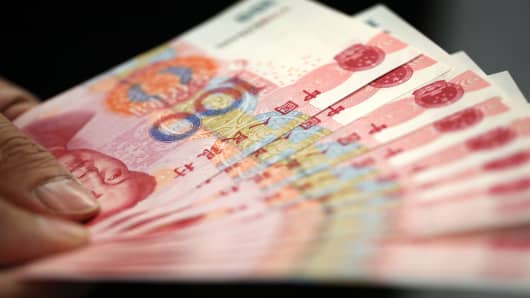The likelihood that the U.S. Federal Reserve could start tapering its massive quantitative easing (QE) program in the second half of the year has already started to create a chain of reaction in global financial markets.
But the impact of such a pullback could be much bigger for the world's second largest economy, leading to the risk of a liquidity squeeze in China, according to French bank Societe Generale.
"The implications for China may potentially give cause for concern in the near-term," Wei Yao, China economist at Societe Generale, said in a note on Thursday. "We see a good chance of capital outflows and yuan depreciation in the second half. Together with the wave of financial regulatory tightening, the economy will be at risk of a liquidity squeeze."
(Read More: Why Markets May Be Over-Reacting to Fed Tapering)
In 2012, China's capital outflows totaled $100 billion or 1.2 percent of gross domestic product (GDP) triggered by the heightening of the European sovereign debt crisis, along with a slowdown in China's economic growth in the middle of the year, Wei said.
Tapering by the Fed could result in another large scale capital outflow, "which could materially squeeze onshore liquidity conditions," Wei adds.
Rob Subbaraman, chief Asia economist at Nomura backed that sentiment, saying that Fed tapering could lead to tightening liquidity in China and impact the Asian giant's economic growth in the second half.
"You could argue that liquidity tightening is already happening. The 7-day [benchmark] repo rate [in China] has shot up to over 5 percent," Subbaraman said, cautioning, however, that this probably has more to do with domestic factors, such as the government cracking down on illegal capital inflows (e.g. over-invoicing exports) and tightening regulations on shadow banking activities.
(Read More: Stop Fixating on Data, China Doing Fine, Says Roach)
Subbaraman adds that China's trade and capital flows could be affected if the Fed pulls back on its monthly $85 billion bond purchase program especially if other major emerging markets are impacted and China's exports drop sharply.
"China's GDP growth may slow more than our baseline forecast, as the government may not be able to fully offset the adverse effect of weak external demand," Subbaraman said, forecasting 7.5 percent GDP growth this quarter and then a slowing to 7.2 percent by the fourth quarter.
A series of negative economic data out of China in the past month, like a contraction in factory activity for the first time in seven months and weak export growth, have added to fears that recovery in the powerhouse economy may be losing steam. Plus, both the International Monetary Fund (IMF) and the Organization for Economic Co-operation and Development (OECD) cut their 2013 growth forecasts for China last week.
Economists are looking ahead to May economic data due this weekend such as industrial production, exports, retail sales and inflation to see which direction the economy is heading.
But the BOJ Is Still Easing
Frederic Neumann, co-head of Asian Economics Research at HSBC, however, said that tapering of QE in the U.S. isn't going to have a large impact on China, because the Bank of Japan (BOJ) will continue easing.
"Even if the Fed is tapering or likely to taper at some point, the BOJ is easing a lot and some liquidity created by the Bank of Japan should offset the withdrawal of liquidity by the Federal Reserve," Neumann said.
In April, the BOJ announced plans to nearly double its monetary base to $2.9 trillion by the end of 2014 to pump money into a flagging Japanese economy.
The BOJ is just at the start of ramping up its easing and expanding its balance sheet, according to Neumann, who expects China's growth to pick up in the second half on a pipeline of stimulus from the government.
(Read More: Japan Fires 'Third Arrow,' but Will It Work?)
"We saw tremendous increases in social financing, we know that local governments are likely to ramp up infrastructure spending," Neumann said. "We still feel fairly comfortable with this idea that the second half will be stronger than the first."
Louis Kuijs, chief China economist, RBS, meanwhile, said the fading out of quantitative easing in the U.S. could probably be good news for China and the rest of the world, because it means that the Fed has concluded that the U.S. economy is doing better, which should boost Chinese exports.
Kuijs adds that liquidity concerns in the Chinese economy shouldn't be an issue, because that can be created "easily" by its own financial system.
"Usually the problem in China is other way around where there is too much liquidity, because China normally runs a large balance of payment surplus and then PBOC [People's Bank of China] tends to sterilize and mop up some of these incoming flows," Kuijs said. "The PBOC can create the liquidity if that is needed."
— By CNBC.com's Rajeshni Naidu-Ghelani. Follow her on Twitter @RajeshniNaidu


